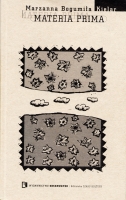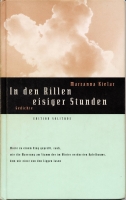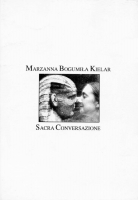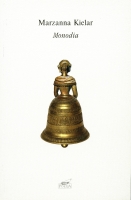Marzanna B. Kielar
Piotr Śliwiński: "Polyphony" [in:] New books from Poland. Fall 2006. The Book Institute, Kraków, s. 63
(...) Marzanna Bogumiła Kielar (born 1963) began the season with a volume entitled "Monody". Kielar is a private, reserved poet whose output is not great, but who always writes well considered, perfect poetry. Her new collection continues the work she began with her acclaimed debut ("Sacra conversazione", 1992) and followed with her second book ("Materia prima", 1999). Its cohesion is determined by the poetic form, which is a distant reference to symbolism, based on seeking the correlation between an outer and inner scenery.
Kielar strives to portray something that could be called a fundamental landscape. This is the space in which we experience a sense of connection with the most important forces that shape human life. For Kielar the most important of these are death and love. The former is associated with decay, damp, erosion, cold, ice, lakes and ancient forests - in short, it is part of nature. Likewise love; Kielar seems to regard it as having a separate, objective existence... in which case, is it generally and ordinarily humanly possible? Yes, for those who understand that we are like "organic additives / trapped in ice: seemingly indissoluble interferences". Because a mature, humble attitude towards transience leads to the ardent joy of existence and an uneasy hope of surviving within what transcends us.
Kielar is a consistent poet, but she is not obvious or easy. Her poetry includes few phrases ready to serve as mottos for life, her love poems avoid being formulaic melodramas, her religiosity steers clear of plain declarations, her pessimism eludes vulgar importunity and her imagination is not hampered by any taboos. (...)
Kielar strives to portray something that could be called a fundamental landscape. This is the space in which we experience a sense of connection with the most important forces that shape human life. For Kielar the most important of these are death and love. The former is associated with decay, damp, erosion, cold, ice, lakes and ancient forests - in short, it is part of nature. Likewise love; Kielar seems to regard it as having a separate, objective existence... in which case, is it generally and ordinarily humanly possible? Yes, for those who understand that we are like "organic additives / trapped in ice: seemingly indissoluble interferences". Because a mature, humble attitude towards transience leads to the ardent joy of existence and an uneasy hope of surviving within what transcends us.
Kielar is a consistent poet, but she is not obvious or easy. Her poetry includes few phrases ready to serve as mottos for life, her love poems avoid being formulaic melodramas, her religiosity steers clear of plain declarations, her pessimism eludes vulgar importunity and her imagination is not hampered by any taboos. (...)









